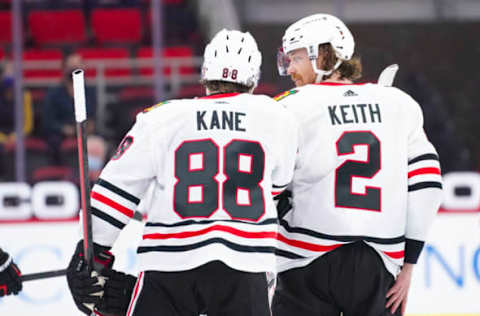Oilers: Some thoughts on Ryan Nugent-Hopkins contract extension


Earlier this week the Edmonton Oilers announced they had re-signed the Ryan Nugent-Hopkins. The deal is for $41 million over 8 seasons. Thanks to Pierre Lebrun’s Twitter account, we could see the breakdown as follows:
21-22: $5M salary
22-23: $5.25M salary
23-24: $6.25M salary
24-25: $6.25M salary
25-26: $4M salary plus $2M sb
26-27: $2.25M salary plus $2.5M sb
27-28: $2.5M salary plus $1.25M sb
28-29: $3.75M salary
This is a quintessential Ken Holland contract. Back when the salary cap was 1st introduced in the 2005-06 season, Holland in Detroit used the 1st couple of years of it to sign his players to contracts with even bigger gaps like this – often in the 2nd last to last years of the contract, it would go down from $5 million or so to $1 million or so. This was designed to lower the cap hit – which of course the player won’t care about but the team will – to help Holland circumvent the cap in Detroit.
Then the league intervened and made a rule that you can’t decrease the salary in a multi-year contract year over year by more than 20% and Holland had to make his contracts with less extreme differences in salary. Let’s take a closer look at the pros and cons of this contract:

Pros
The cap hit goes down
Nuge’s old cap hit was $6 million, in his new contract that goes down to $5.125 million. That $875,000 might not seem like much but once the cap starts going back up again and key players like Nuge are locked up, repeat this type of contract creativity many times over and the Oilers will stay out of cap hell – at least in theory.
It crosses a key item off his offseason to-do list
This contract was key to Holland’s offseason, and now it’s done and he can prepare for other areas of the team he has to take care of – including no longer fearing the July 17 deadline in which Seattle can sign your free agents before they go to market and the risk in the game gets bigger. Nuge also would’ve been harder to replace than any other Oiler free agent – there are other players who can put up comparable numbers offensively like Sam Reinhart or Tomas Tatar but they all have warts that come with risk. In Reinhart’s case, he’s swiss cheese defensively – playing on Buffalo might have something to do with it, but there’s no guarantee that would come up to snuff enough on a better team. Tatar is older, so you can’t lock him up for as long.
Nuge was a known commodity who we know fits in on the roster and we know wants to play here. There’s therefore less risk in bringing him back than in bringing in somebody new. Not to mention he supposedly just built himself a house within the last year and his wife is from Red Deer, while he’s from Burnaby, which is not a long plane ride away from Edmonton.
As the St. Louis Blues found out when they traded for Gretzky in 1996, there’s no guarantee when you trade for a guy – even when he’s the best of all time – that he’ll fit in on your team.
This was the most important contract to get done, and now it’s done. It took Holland 18 months to get it done, and he said this was the most grueling negotiation he’d ever done in his press conference to announce the contract.
It better reflects his value going forward
In the final year of the contract – when Nuge is 36 – he’ll have a cap hit of just over $5 million but only $3.75 million in actual salary. If the Oilers were to ever trade him – probably won’t happen, but that’s a long way off so never say never – he’ll be more attractive to teams who have lots of cap space but not looking for an expensive player.
The contract is front-loaded in years 3 and 4 with a $6.25 million salary, the peak of the money he’ll make going forward as an Oiler. That’s during a time when traditionally NHL players are still contributing well to a team.
If he retires at 36, it gives him the opportunity to be an Oiler his entire career, something no other player in Oilers history has been able to say.
In years 5-7 of the contract – when he’ll be making the least amount of money, he’ll cash in with a signing bonus every July 1 of those years to help cushion the blow.
Let’s face it – we don’t know the future but there’s a good chance the contract could become bad before it’s time. At least it’s more palatable to get rid of if we want to do that. It gives the club options.T

Cons
The NMC
It always makes me nervous when teams give a player a no-movement clause in their contract, because it makes it that much harder to move it if they need to. If Nuge starts his decline earlier than expected, that would be a huge impediment to moving it as a gamble on the player didn’t pay off. But, in proper negotiation, you have to give a little if you want to get a little. Nuge mentioned in his press conference after the contract that this was something they insisted on. If he was, say, Juhjar Khaira then Holland would’ve laughed in the face of his agent, but with an important player like Nuge, you have to compromise in new contracts sometimes.
He’ll be 36 by the time the contract ends
It always makes me nervous anytime an NHL club signs a player past the age of 35. Again, Nuge expressed that he wanted term in the contract, which was important to him and his agent.
He probably could’ve made more on the open market, but he wanted to stay an Oiler, so the club has to take on some risk too, not just the player in this regard.
Still, though, by year 7 this contract could go bad if history has anything to say about it. Maybe not, but you just never know. That’s a risk.
His contract year season
This past season Nuge’s even-strength scoring went down, so some people are concerned that this is a new normal for him. Considering the history of Nuge, I tend to think he’s young enough that last season’s even-strength scoring numbers are just an aberration. But, I get it. If Nuge downgrades himself to a PP specialist just like James Neal, then we just signed that guy for 8 years. IMO this concern is melodramatic, but I get it.

Oilers’ bottom line on the contract extension.
Ken Holland put it best in his press conference when he said that the player didn’t get everything he wanted and the team didn’t get everything they wanted. This is the best compromise they could come to, so this is par for the course for a contract of this magnitude.
Bonus material
A lot of writing space as of late has been dedicated to the Oilers being connected to trading for Duncan Keith. This is supposedly happening due to the unknown status of Oscar Klefbom and the fact his career could be over.
Caleb Jones is rumored to be going the other way as Chicago is planning to aggressively pursue his brother Seth in free agency and they’re looking at this as a way to attract him to Chicago.
His family is from Penticton, BC, which means that he wants to go to one of the Western Canadian teams – Vancouver, Calgary, Edmonton, or Winnipeg – and the Oilers are supposedly the front runner for his services.
I gotta tell ya, I can’t see it, especially as diving further into this rumor Hawks GM Stan Bowman refuses to take bad contracts back or retain any salary. Keith’s cap hit is $5.538462 million for 2 more seasons. He’s turning 38 in mid-July, and his boxcars have nosedived for 2 seasons straight, while he finished with a -13, the 2nd worst mark of his career.
Stan Bowman is dreaming in technicolor if he takes a hardheaded stance on this player and thinks a deal will be done without some compromise on his part. After all, the player holds all the cards. He only wants to go to 1 of 4 teams, his performance is obviously declining and at his age is unlikely to get better. His skills on both offence and defence appear to be on the decline, so at his current cap hit what is the incentive for anyone to trade for him? It makes no sense.
Or, as David Staples in the Journal put it:
Duncan Keith is no longer worth $5.5 million per year. If Chicago isn’t willing to retain a major amount on Keith’s contract, why would the Oilers trade for him?
My thoughts exactly.
There are, after all, much better options in free agency. Those players wouldn’t cost the Oilers in trade. It’s not our job to better Chicago’s roster, but our own. If they’re not going to be keeping enough cap to make the deal worthwhile, then it’s not worth making.